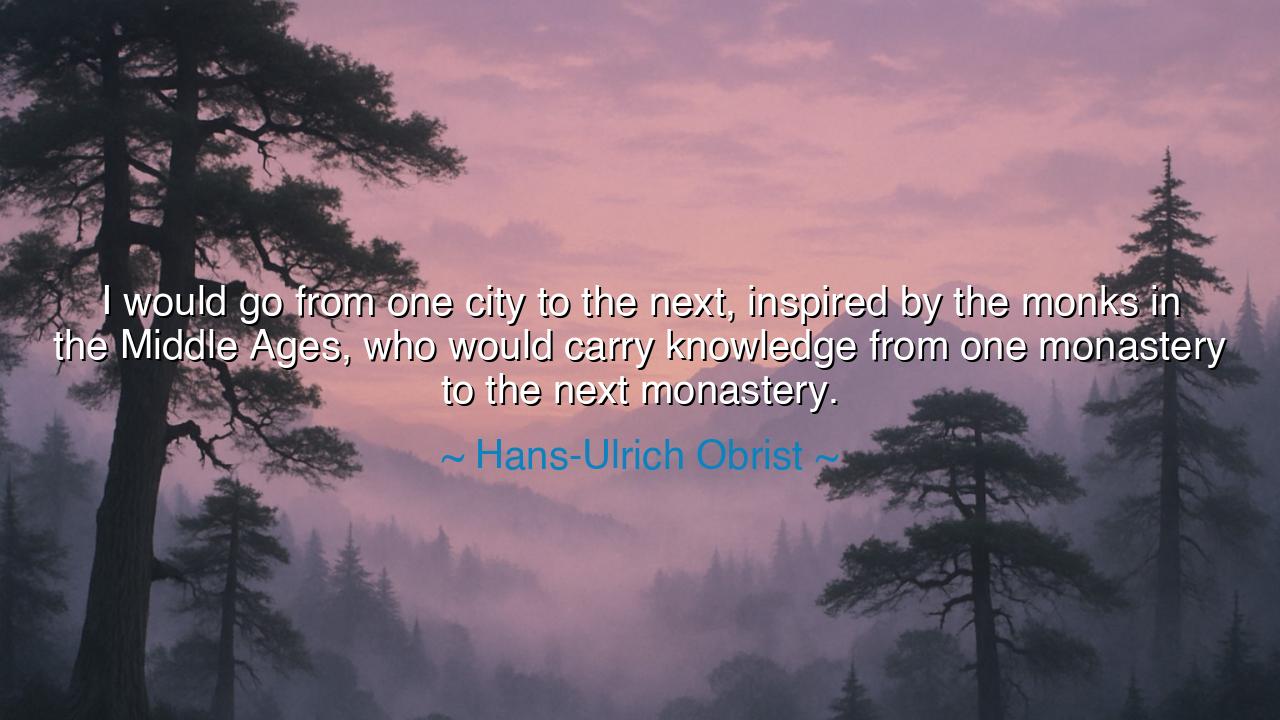
I would go from one city to the next, inspired by the monks in
I would go from one city to the next, inspired by the monks in the Middle Ages, who would carry knowledge from one monastery to the next monastery.






Hear the words of Hans-Ulrich Obrist, who said: “I would go from one city to the next, inspired by the monks in the Middle Ages, who would carry knowledge from one monastery to the next monastery.” This is no idle reflection, but a vision that binds the present with the past, a reminder that the sacred duty of transmitting knowledge is as old as civilization itself. Obrist, as a curator and guardian of ideas, likens himself to those who walked through dark and dangerous times, bearing the flame of wisdom from place to place, lest it be extinguished.
The monks of the Middle Ages were not warriors with swords, but defenders of light in an age of shadow. While empires crumbled and wars raged, they guarded manuscripts, copied sacred texts, preserved the works of philosophers, poets, and scientists. Their journeys between monasteries were pilgrimages of preservation, carrying with them the treasures of human thought. Without their labor, much of the wisdom of antiquity would have vanished into silence. Obrist’s words echo this noble tradition, for he too saw his task as the carrying of ideas across borders, ensuring that culture and learning remain alive.
To go from city to city is to become a bridge between worlds. In ancient times, the wandering scholar was the lifeline of learning, traveling with scrolls and parchments, exchanging teachings in marketplaces and courts. Even as the road was fraught with danger, these messengers of truth pressed onward, knowing that knowledge, if left stagnant, decays, but if carried and shared, multiplies. Obrist calls forth that same spirit, recognizing that wisdom is not to be hoarded but to be sown, like seeds carried by the wind from field to field.
History offers us an example in the figure of Alcuin of York, who traveled from the schools of England to the court of Charlemagne. There, he brought learning to the Carolingian Empire, inspiring the Carolingian Renaissance—a rebirth of scholarship, art, and faith. He embodied the spirit of the monks, moving from one seat of learning to another, ensuring that what was known in one place would be shared in another. In this way, the fragile threads of culture were woven into a fabric strong enough to survive the centuries.
The meaning of Obrist’s words is both historical and prophetic. He reminds us that in every age, the guardians of knowledge must travel, must exchange, must carry ideas where they are needed most. The role of the curator, the teacher, the writer, or the pilgrim of thought is no different than that of the monks: to protect wisdom from being lost and to ensure that no city, no people, is left in darkness.
The lesson for us is this: each of us is a carrier of knowledge. We may not walk between monasteries, but we move between homes, schools, communities, and nations. In every encounter, we bear ideas—truths, stories, skills—that may illuminate the lives of others. If we keep them locked within, they die. If we carry and share them, they grow. To withhold knowledge is to bury treasure in the ground; to share it is to enrich the world.
And what must we do in practice? Become like the wandering monks: read widely, learn deeply, and then pass on what you have gathered. Speak to others with generosity, teach the young, preserve the wisdom of the old. Support libraries, schools, and cultural institutions—the modern monasteries of our time. Carry the flame of learning wherever you go, and let no city, no soul, remain untouched by its light.
Thus let Obrist’s words endure as a call: to be bearers of knowledge, to journey from city to city, to embody the spirit of the monks of old. For though empires fall and centuries pass, the sacred duty remains the same—to carry wisdom across the ages, so that humanity may never walk in darkness, but always in the light of understanding.






AAdministratorAdministrator
Welcome, honored guests. Please leave a comment, we will respond soon